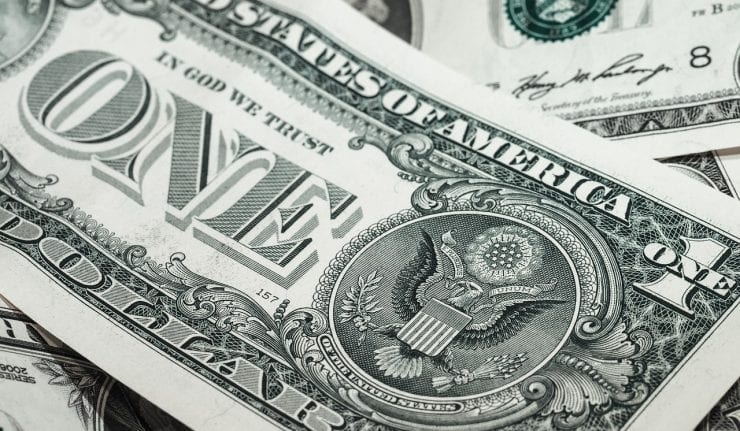One of the most frequently asked questions I receive from investors, whether it is at a conference such as the MoneyShow or FreedomFest, via email from readers or at any social gathering where people know about my occupation, has to do with what are sometimes called “the twin Ds,” i.e. deficits and debt.
This subject has become of particular interest to many, given the massive deficits and debt headed our way due to the government’s multi-trillion-dollar stimulus packages to fight the coronavirus pandemic. But just how massive is that debt?
Well, last week, the U.S. Treasury sold 20-year Treasury bonds for the first time in 34 years in response to the colossal amount of debt that needs to be raised to pay for the various stimulus packages. Not surprisingly, the resurrection of that bond further fueled a debate about whether the exploding debt that is funding the coronavirus response will be a long-term negative for the economy, the dollar and, by default, investors.
Up until this pandemic, the question of deficits and debt wreaking havoc on the economy was more of an academic argument. That’s not the case any longer. Why? Because most adults know that it’s impossible to always spend more than you take in and simply keep adding more and more debt without something really bad happening. And that personal knowledge is being extrapolated out to the U.S. government’s finances as the multi-trillion-dollar stimulus packages rack up.
To help me unpack the question of whether the ramp-up in the twin “Ds” is going to represent a serious threat to the economy and the markets, I turned to my friend and brilliant colleague, macro analyst extraordinaire Tom Essaye of Sevens Report Research.
Tom is a regular contributor to my Successful Investing and Intelligence Report newsletters, and he’s also the editor of a highly recommended daily publication called the Sevens Report.
Here are a few thoughts we bandied around during a recent discussion we had on this hot topic.
Jim Woods (JW): I am constantly being asked about deficits, debt and the buildup of both as they relate to the potential negative consequences they can have on the economy and the markets. These days, those questions are more relevant than they’ve ever been. What’s your assessment of this situation?
Tom Essaye (TM): I think the concerns over the massive new levels of spending and the resulting deficits and debts to follow, are justifiable. Yet while we should be concerned, the deficit and debt are unlikely to derail the U.S. economy or the market over the longer term.
JW: Why do you say that?
TM: The reason comes down to one key factor, and it’s the so-called “TINA” trade, i.e. “There Is No Alternative” to either U.S. Treasuries or the U.S. dollar. Yes, it’s totally true that an already “not good” U.S. fiscal situation has been made exponentially worse by the coronavirus fallout and stimulus packages. Numerically speaking, consider that the U.S. deficit-to-GDP ratio will spike from about 4% in 2019 to nearly 20% in 2020!
Put in real dollar terms, the U.S. federal deficit was about $1 trillion per year at the end of 2019. It is expected to be $3.7 trillion by the end of September, and that’s not including the latest $3 trillion stimulus bill working its way through Congress. Meanwhile, U.S. GDP in 2019 was about $21 trillion. Let’s say it’s down 5% to $20 trillion in 2020. That means that the budget deficit for 2020 will be around 18%. That’s much higher than the 10% peak following the financial crisis. In fact, that’s the highest deficit-to-GDP percentage since World War II!
JW: Given that increase, you would think that global investors would be selling the U.S. dollar and Treasuries. But instead, the opposite is happening.
TE: Yes, and the reason why is because every other country is in a similar situation. In fact, every major economy, including the countries of the European Union, Britain, China and Japan, all are having to raise massive amounts of money to offset the negative impact from the coronavirus. And since currencies and global bonds are all relatively priced, the net effect is that everyone’s fiscal standing has been downgraded, not just the United States’. Given that, there remains no alternative (TINA) to U.S. Treasuries.
Put plainly, the United States is in not good fiscal shape, but so is virtually everyone else, and since capital needs to be placed in assets where investors are confident it will hold value, there remains nothing that can challenge the size and stability of the U.S. Treasury market. It may confound economic fundamentalists, but the simple truth is that demand for U.S. debt is surging despite the explosion in the deficit, and that’s because Treasuries remain the safest, most-liquid sovereign bond in the world — despite the exploding deficits and debt.
JW: I suppose that until something (i.e. a sovereign bond) can challenge that, which I don’t see on the horizon, then the global market will tolerate a deteriorating U.S. financial situation far longer than the economic purists might think.
TE: Exactly. And as for the dollar, well, it remains the world’s reserve currency, and that also helps give the U.S. a “pass” on a lot of her fiscal problems. Last week, I read that approximately 50% of the world’s debt is priced in U.S. dollars. That means the world needs a lot of dollars, and that puts the U.S. in a very powerful position. It also incentivizes the global economy to support the value of the dollar and keep it stable, because if it becomes unstable, everyone loses. So, while it’s not fiscally responsible, the U.S. debt and deficits don’t matter to stocks as long as the U.S. is able to sell Treasuries to finance the gaps.
JW: I guess that means that U.S. deficits and debt won’t matter until they become so bad that global investors don’t want to buy Treasuries anymore.
TE: Yes, and that won’t happen until the U.S. fiscal situation gets a lot worse, or there becomes a viable alternative to U.S. Treasuries or the U.S. dollar in the global bond and currency markets. None of those events are looming, and as such, despite the negative headlines, the deficit and debt are unlikely to hurt the equity rally or the economy near term.
Now, just to be clear, I’m not telling you or your readers that deficits and debt will never matter. I think that if left unchecked, and the deficit runs through 30% in the coming decades, then yes, at some point the market will begin to shy away from Treasuries. At that point, financial hell will break loose. And if things don’t change in the trajectory of the U.S. fiscal position, that will happen one day, but it’s very unlikely to be a day anytime soon.
JW: So, while deficits and debt make for interesting conversation, they aren’t going to be an immediate market influence unless there’s a massive and rapid deterioration.
TE: I think that’s right, and I think that while it’s something to have on our radar, for now it’s not a reason to let fear of the twin Ds keep you from investing and growing your money.
JW: Thanks Tom, as always, you’ve been a rational lighthouse in a fog of COVID-19 uncertainty for myself and my readers.
P.S. Did you watch my live summit, “Action Plan for the Wipeout and Recovery” this afternoon? If so, I hope you found it interesting and actionable. If you missed it, then don’t fret. This timely emergency briefing on how to handle this volatile market is too valuable, so we made sure you can watch a replay of the event right here. Don’t miss this special presentation, and don’t miss out on learning about three of my favorite trades designed to double your money!
*********************************************************************
The Honesty of Wealth
“When you are rich, you can afford to be honest.”
— Dr. Mark Skousen
This week’s quote comes to us from my friend and Fast Money Alert co-editor Dr. Mark Skousen, and it’s one of his many brilliant insights. Here, he reminds us that having financial means gives you freedom to do the things you want to do. Perhaps more importantly, it allows you to say the things that must be said, even if they upset or offend.
Of course, we shouldn’t say things for the purposes of offense, but rather because truth is a virtue and dishonesty is an injustice to reality. So, invest wisely, get rich, tell the truth and be noble. It will make you feel good, and it will help the world be better.
Wisdom about money, investing and life can be found anywhere. If you have a good quote that you’d like me to share with your fellow readers, send it to me, along with any comments, questions and suggestions you have about my newsletters, seminars or anything else. Click here to ask Jim.
In the name of the best within us,

Jim Woods




